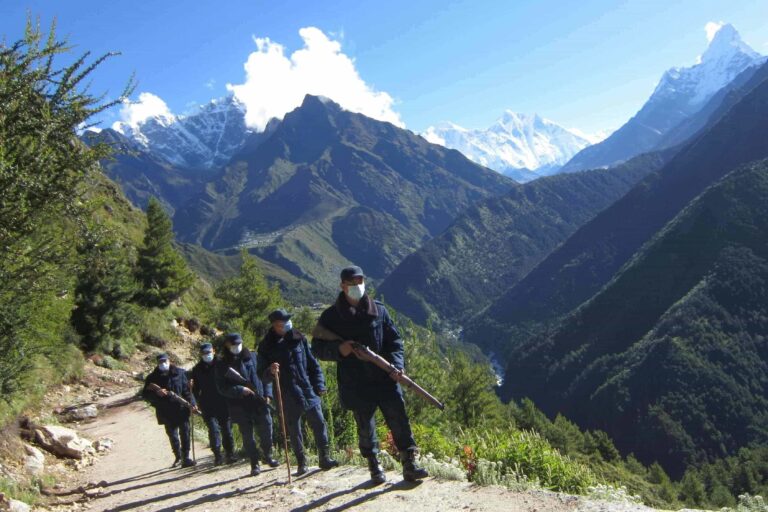The Nepal government has introduced a bill to amend the Nepal Police Act of 1955. This bill, titled ‘Bill to Amend and Consolidate the Laws Related to the Nepal Police,’ was registered in Parliament on January 28. Many police officers, however, are concerned about some of the bill’s provisions. These concerns are mainly focused on how it will affect the control, mobilisation, and supervision of police personnel.
The Role of the Ministry of Home Affairs
The Ministry of Home Affairs registered the bill with the aim of addressing several issues. These include recruitment, retirement, and the roles of different authorities in overseeing the police. The bill clarifies the roles of the Ministry of Home Affairs and district officials in controlling the police. However, officers have raised concerns that these changes could undermine their independence.
The bill proposes that the Ministry of Home Affairs have the power to mobilise, control, direct, and supervise police personnel. Police officers are unhappy with this. They feel that it takes away their authority. They argue that, under current law, the police are mobilised under the district police chief. Giving the Ministry direct control would disrupt this structure.
Concerns About Police Mobilisation
The bill states that the Chief District Officer (CDO) will direct police officers in each district. This would include maintaining peace, security, and law and order. The bill also suggests that if orders need to be given to police personnel, the CDO should communicate these through the police chief at the station.
This provision has caused a lot of disagreement. Police officers believe that only the district police chief should mobilise the force. They feel the bill takes away their control over mobilisation. A senior officer at the Nepal Police headquarters, who wished to remain anonymous, said, “The ministry can supervise, but only the existing law and the IGP should mobilise the police force.”
Civilian Supremacy and Chain of Command
Some government officials disagree with the police’s concerns. Umesh Mainali, a former Home Secretary, explained that the CDO already has the authority to direct police officers. Mainali pointed out that in a country with civilian supremacy, civil servants should have control over security forces. He believes this bill follows a long-standing tradition.
However, former Deputy Inspector General (DIG) Hemanta Malla responded to these concerns. Malla said that the police are not challenging civilian authority. Instead, they are worried about their independence. He pointed out that, historically, the police have evolved from being a tool of law enforcement to a service force. He fears the new bill risks turning them back into a mere instrument without much autonomy.
Political Influence in Appointments
Another issue with the bill is the process for appointing the Inspector General (IG) of Police. The bill suggests forming a committee to recommend IG candidates. This committee would be led by the Home Secretary and include a retired IG and a secretary from the Prime Minister’s Office (PMO).
Police organizations and the Public Service Commission (PSC) are concerned that this could allow for political interference. Currently, the PSC does not play a role in selecting the IG. Officers believe involving political figures in this process could compromise the independence of the police force.
Proposed Changes to Tenure
The bill also proposes changes to the tenure of the IG and additional Inspector Generals (AIGs). The Home Ministry wants the IG to serve a three-year term, while the AIGs should serve four years. Police organizations and the PSC have opposed these plans. They believe the IG should serve for three years, but AIGs should have a longer tenure.
Retirement and Service Durations
The bill includes several proposed changes to retirement rules. The proposal states that senior officers, such as Inspectors and above, will retire after 20 years of service. Constables and head constables will retire after 16 years, while assistant sub-inspectors will retire after 18 years.
The bill also sets new age limits for retirement. The proposed retirement age for the IG is 60. For AIGs and DIGs, it is 59. Senior Superintendents of Police (SSPs) and Superintendents of Police (SPs) will retire at 58. Deputy Superintendents of Police (DSPs) and Inspectors will retire at 57. Additionally, the minimum age to become an Inspector has been raised from 25 to 27 years.
Government’s Response
Ram Chandra Tiwari, spokesperson for the Ministry of Home Affairs, acknowledged the concerns of police officers. He stated that the bill had been registered in Parliament and would be reviewed and deliberated on by the legislature.
Home Minister Ramesh Lekhak reassured the police that the bill would be revised before it is formally endorsed. He expressed hope that the concerns raised by officers would be addressed.
As the bill moves through Parliament, the final decision on these matters remains uncertain. The police force continues to voice its concerns about the bill’s potential impact on their independence. Will the government make changes to address these concerns, or will the bill pass as it is? Only time will tell.
For more updates on this issue, visit Nepal Monitor.


